|









|
Harveyís
China Memories:
1993
Memories of China
We had been to China in 1991, part of a group of British tourists escorted
round some of the most famous sites. We
visited the Ming Tombs, just outside Beijing; walked on the Great Wall;
took a train journey to Chengde, the old summer resort of Emperors; flew
to Xian, the old western capital of China and home to the Terra Cotta
Warriors; and, of course, walked through the Forbidden City.
We returned two years later. Hong
Kong was nearing its end as an outpost of the British Empire, and work had
started on the Three Gorges Dam. We
wanted to experience both before it was too late.
Feeling that we were now seasoned travellers we thought we would dispense
with the tour party and fix our own itinerary.
This is not quite so hairy as it sounds.
The ubiquitous CITS (China International Travel Service) is always
at hand to make sure that honoured guests do not wander too far from the
beaten (and approved) track.
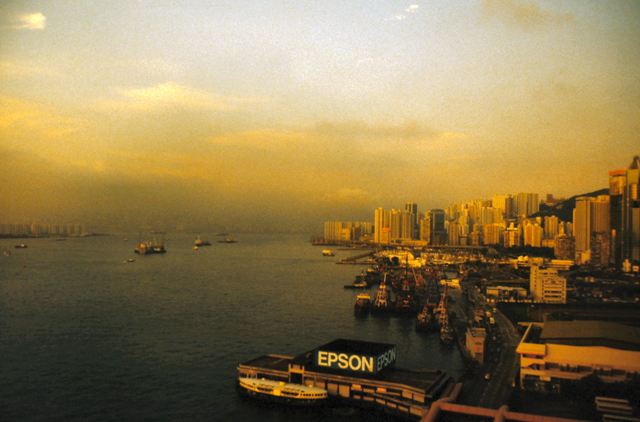
And so in 1993 we flew direct from London to Hong Kong.
Twenty years earlier my flight to Sidney had to refuel three times
along the way, making the journey seem interminable, but now we were on
the edge of the Pacific in 12 hours. Sue
did not feel well when we arrived, and wondered if she had picked up a bug
from the planeís recycled air. We
managed to get around Hong Kong; the ferry to Kowloon; a trip round the
island to Aberdeen; the tram to Victoria Peak, but Sueís flu-like
symptoms persisted.
She was still suffering when we flew, courtesy of Dragon Air, to
Guilin in the south of China. This
was a magical place. If you
have ever seen paintings of Chinese landscapes, with conical hills and
steep valleys, they were probably depicting Guilin.
We checked into our hotel in the evening and were booked on a river
cruise next morning. Off we
went down the Li River, still feeling slightly rushed.
I didnít even have time to change some travellersí cheques.
But we relaxed as the boat took us winding through improbable
limestone outcrops known as carsts, some with temples or pagodas on top.
For some reason I thought of a childhood memory.
I have never been able to sing in public, but when I was very small
I used to sing ďIíd like to get you, on a slow boat to China, all to
myself, alone . . . ď And
now here I was.
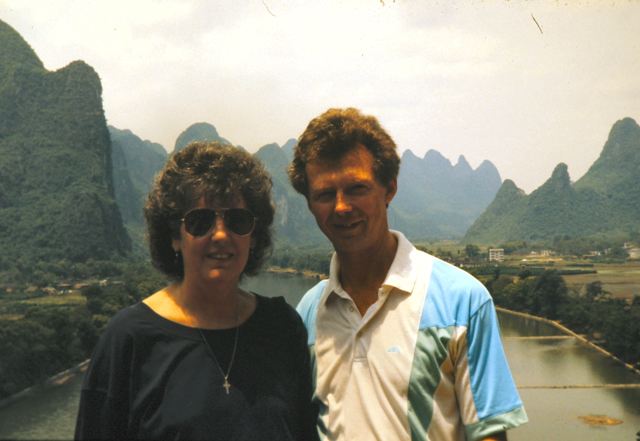
We were the only westerners on the boat, and not surprisingly all the
announcements were in Chinese. So
when we pulled up to a jetty in a small village we had no idea why.
Two people came to the boat, a woman and a man carrying a chicken.
Then, over the public address system, our names were called.
Did they mean us? Perhaps
there is another Mr & Mrs Tordoff on board.
But no-one else moved, so very apprehensively we stepped forward.
The woman greeted us in English.
She was a guide with CITS and had come to collect us.
The man was her driver. He
didnít often get out into the country, so while waiting for us he had
bought himself a chicken for his dinner.
We went ashore and the boat continued its journey.
We had no idea where we were, why we couldnít stay on the boat,
or what was going to happen next. The
story unfolded as we were driven back towards Guilin.
Our plan had been to have two nights here, then fly to Chong Qing
for a three day cruise down the Yangtze.
But when CITS had made the reservations for us, they had overlooked
the fact of a public holiday, on which day there
were no flights to Chong Qing.
If we didnít fly out of Guilin today we would miss the Yangtze
cruise. There was no time to
finish the Li River cruise; we were taken to the hotel, grabbed our
suitcases, and whisked off to the airport.
Pretty impressive! Not
quite. We couldnít get on a
flight to Chong Qing; our only option was to depart from our itinerary and
fly to Chengdu. From there,
eventually, we would be able to catch a flight to Chong Qing.
Unfortunately, the airline wanted to be paid for this extra flight,
it wouldnít accept a credit or a debit card, and we didnít have any
Chinese currency. (In those
days ATMs were not available on every street corner, or in Guilin
airport.) We put our
left-over Hong Kong currency on the counter, our US dollars reserves that we
always travelled with, and our remaining English money.
It wasnít enough. Our
CITS guide was quite beside herself by this time.
She had rescued us from the Li River, got us to the airport in
time, the plane was on the runway ready to take off, and she couldnít
get tickets for us. She got
her own purse out and started putting her own money on the counter.
It still wasnít enough. Our
guide and the airline rep appeared to be shouting at each other, but this
wasn't unusual in China. Following one such heated exchange the guide took her own money back,
pushed our
money back to us, and the airline clerk wrote out two tickets. We
had no idea what had happened, but before anyone could change their minds we ran
through the departure lounge and onto the waiting plane.
We were flying to Chengdu, wherever that was.
We discovered that Chengdu was in the south-west of China, the
stopping-off point for Tibet. We
were only a short flight away from Lhasa.
Could we abandon our itinerary completely, and visit The Potola?
Surprisingly, for all that we had felt involved with Tibet for over
thirty years, we never seriously considered that we might actually go
there. Perhaps this trip was
preparing us, because in 1995 we did fly to Lhasa from Kathmandu.
When we woke up in Chengdu we were more concerned with money. Today
was the public holiday we had heard about, and the bank in the hotel was
closed. The hotel cashiers
were unable to cash travellers cheques, and the banks in the city would
also be closed. Sue was
too ill to worry about such mundane matters and went back to bed, leaving
me with the freedom of the city ~ as long as I didnít want to buy
anything.
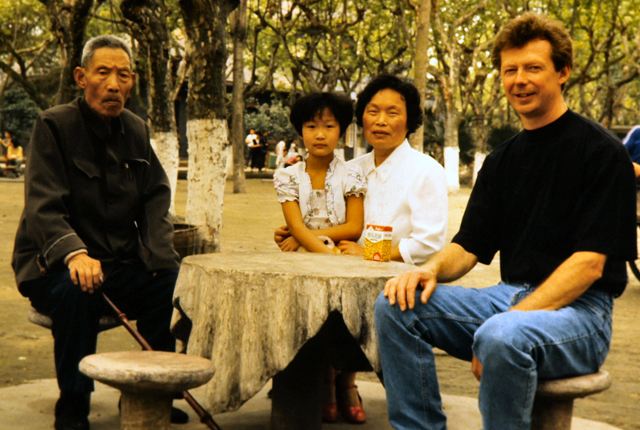
I wandered through the side streets, feeling conspicuous as the only
westerner. Two years earlier
in China , westerners appeared to have a novelty factor that excited
attention , but now but no-one looked at me.
I came to the city, which seemed to be one enormous mass of
roadworks, and eventually found myself in a park, where Chengdu
families were enjoying the holiday. I
remember a monorail, with little chairs gliding by overhead.
Well, they didnít exactly glide; the passengers had to pedal
their way round. One family
wanted to pose for my camera. They
spoke some English and gave me their address so that I could send them
copies. I did, but I never
heard whether they received them.
Later that evening we were taken to the airport with Sue still not feeling
well. When we landed
there was no-one to meet us. Our
changed itinerary had failed to reach CITS in Chong Qing.
We had no mobile phones in those days, and no money to try the
public telephone system. We
stood outside the airport, mobbed by taxi drivers.
None of them spoke English, but we selected one at random and
managed to tell him the hotel name. He
wrote a number down in yuan (Chinese currency) which, of course, we couldnít manage.
We offered Hong Kong dollars, but we didnít have enough.
We added a few US dollars and eventually struck a deal.
Off we went, only to be stopped after a few miles by armed soldiers
at a road block. We had no
idea what was going on, but they studied our passports (which were
probably meaningless to them) and allowed us to pass.
We were relieved to check in to the hotel.
We had disappeared from the CITS radar, but in the morning I would
be able to cash some travellersí cheques and get a taxi to take us to
the river. I knew the name of
the boat (albeit in English) and the pier number.
I could relax.
When we got to our room there was a message waiting for us from the local
CITS guide. He knew of our
existence; just didnít know our whereabouts.
He was actually staying in the hotel.
Whether this was his normal practice, or whether he had been
panicking as much as we had when he realised he had lost two tourists, we
never discovered. At any rate,
he was most anxious to come straight to our room, while all Sue wanted was
something to eat and then go straight to bed.
He came round, we had food brought to the room, and he told us what
would happen tomorrow. Eventually
we got rid of him and flopped into bed.
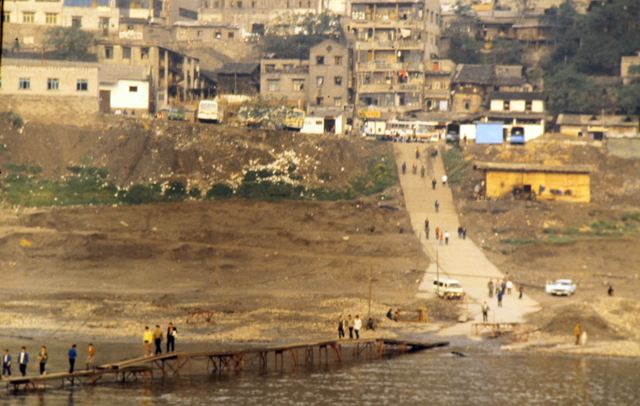
When we arrived at the river I realised I had been over-optimistic,
thinking I could find the boat without a guide.
For one thing, we were going to travel on a different boat.
For another thing, the river was no-where near the river bank.
There was a huge mass of exposed mud, with a network of rickety
walk-ways leading in the general direction of the distant water, and no
sign of pier numbers. But our
guide knew where we needed to go and commandeered two porters for our
cases. We had been advised not
to take soft cases, and so we had huge, rigid containers on wheels.
The wheels were useless on the walkways, and the porters suspended
them from bamboo poles over their shoulders.
The guide took it in his stride but we felt sorry for the porters
and embarrassed at the amount of stuff we deemed necessary for our trip.
On the boat the porters eased their burdens down and rubbed their sore
shoulders. I gave them the
tips the guide had indicated but they didnít show any sign of leaving us
for their next customers. Our
guide was giving us our final instructions before he left the boat but the
porters were getting quite insistent.
I asked the guide what the problem was.
Apparently they complained that our cases were too heavy and they
wanted more money. I didnít
mind the tips, just didnít want to get it wrong.
I asked the guide what I should do.
ďIf you donít want them pestering you all the way to Yichang
you had better give them a bit more,Ē he said.
I did, and they jumped off the boat as we cast off from Pier No. 1.
So now we were on our own again. We
watched Chong Qing coming into context as we pulled away.
It was a big sprawling city tumbling down a large hill at the
confluence of two rivers, the Yangtze and the Jialing.
The rivers seemed to act as dustbins for every conceivable item of
garbage and pollutant. No
problem with landfill here; they just tossed it in the rivers.
Once again, we had no idea what the announcements meant, but over
the next few days we got into the habit of following other passengers.
We didnít always know whether we were heading for a camera call
or a meal, but we tried to be prepared for anything.
If we were in our cabin when an announcement was made we would peer
out of our door to see how other people were dressed.
The first meal wasnít easy. It
was a stand-up buffet. There
is a lot of standing up in China, or squatting.
It made us realise that in the west we take seating for granted in
public areas. At this buffet
we had to balance a drink and a bowl of food whilst manipulating
chopsticks.
There was a large party of Taiwanese, some Japanese, and apart from one
Belgian couple the rest of the passengers were Chinese.
We gravitated towards the other Europeans.
Fortunately, their English was better than our French.
We realised eventually that the guide with the Taiwanese group
spoke some English, and although she had her hands full with her own party
she often took time out to explain things to us.
On one excursion ashore she went into a pharmacy with Sue and
managed to get something for her sore throat and incessant coughing. It
was powdered watermelon seeds, and Sue had to squeeze a puff onto the back
of her throat. It gave instant
relief, although the coughing went on for a few days.
Our first stop was at Fengdu, the City of Ghosts, given over to garish
depictions of the Nether World with graphic examples of punishments meted
out to sinners. Fengdu spread
up the hillside above the Yangtze, which meant climbing a lot of steps.
Above much of the city
there was a mark indicating where the flood
waters would reach when the dam was completed.
For the first time it dawned on us just what a massive project this
was. As we sailed
further down the river we passed many villages that would disappear
completely and tried to imagine the outcry at a similar scheme in Britain.
Perhaps people power has gone too far in the west, sometimes the
interests of the few have to be sacrificed for the many, but the Chinese
governmentís apparent disregard for human suffering and dislocation on a
grand scale made the Three Gorges Dam seem a bit creepy, whatever the
benefits.
Before we reached the Three Gorges we were transferred to a smaller boat
at Wushan for a trip up the River Daning to see the Lesser Gorges.
It reminded us of Borrowdale, our own valley in Cumbria, but
there was never any doubt that this was China: people working
alongside the river; bamboo being transported down river, not in a
container of any kind, just poles lashed together to form a primitive
raft; and the impromptu boat repairs.
Our boat had to navigate rapids and damaged its propeller, so we
all had to get out while the propeller was taken off and hammered back
into shape. More or less.
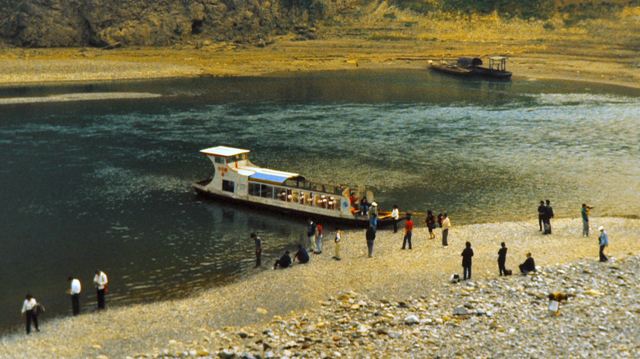
After this the Three Gorges were a bit of an anti climax.
They were much bigger, not as attractive as the Lesser Gorges.
And although this was the main attraction of the trip, it didnít
seem to attract much attention. We
arrived early one morning, and there were only a handful of us on deck
taking photographs.
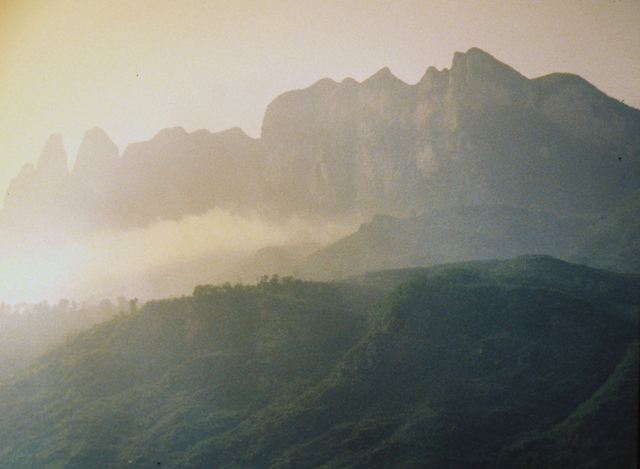
We reached Yichang after a spectacular dawn, with mountain tops and
temples emerging from the mist as the sun broke through.
Then we were taken care of by CITS again.
Our new guide explained the new dam to us, showed us the ship
locks, the model exhibition, showered us with facts that we promptly
forgot. What stays with us,
though, is the height of the dam wall: 100 metres.
We tried to imagine the water backing up through the gorges to this
height. The benefits are
obvious: clean renewable energy and flood control lower down the Yangtze,
but we are left with an uneasy feeling concerning the million people
displaced to make way for the reservoir.
Then, for some light relief, we were shown some of the city sights.
We were taken to a restaurant in a converted temple for a meal.
We were the only diners, and as it was a karaoke bar our guide
entertained us with a few songs before taking us to the railway station
for the night train to Wuhan.
We discovered that we were sharing a compartment with the Belgian couple.
There were two bunk beds against opposite walls, with a narrow
space between. We seemed
uncomfortably close to each other, and with Sueís coughing and my
snoring the Belgians were probably uncomfortable as well.
The toilet was down the corridor, and not a pleasant experience,
but needs must and I made a few trips in the night.
Wuhan wasnít somewhere we particularly wanted to go, simply the best way
of getting to Beijing from Yichang. But
here we were, early in the morning, and a new eager young CITS guide was
waiting for us on the platform, bright-eyed and bushy-tailed and ready to
show us the sights. The only
sight that I can recall now is that of East Lake, a man-made tribute to
all that is beautiful in nature.
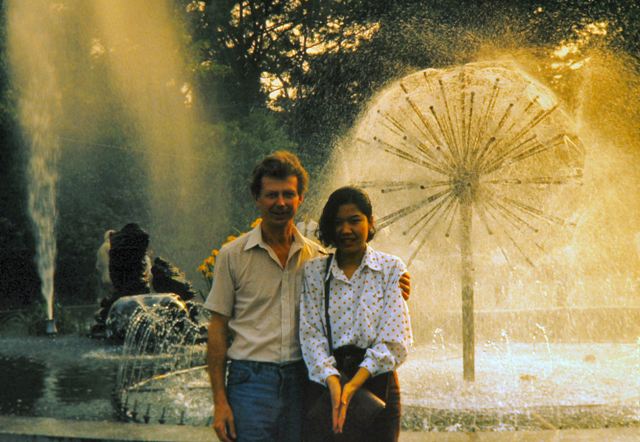
Our
guide must have been unwell, or perhaps merely stressed with the
responsibility of looking after two middle-aged tourists, because during
one car ride between attractions she wound down the window and threw up
out of it, then carried on with her commentary as though nothing untoward
had happened. I also remember
being attracted to a Chinese scroll in a souvenir/antique shop.
It was a landscape in the old style, with no perspective, and went
on for yards. I asked our
guide if it was old. ďI know
that it is quite old,Ē she said seriously. ďOne of my tourists tried
to buy it last year. ď At
least a year old, then, if not from the Ming Dynasty.
It was a relief to sleep in a proper bed in a hotel, after the
uncomfortable train journey and the small cabin on the boat, and suitably
refreshed by our short stay in Wuhan we left for the airport for the last
leg of our journey to Beijing. We
were not being minded by CITS in Beijing, but we had arranged to meet our
guide from Chengde from 1991. We
had exchanged letters for two years and I had sent English novels for her
to read, and a friendship had developed.
Our flight was delayed, but our Wuhan guide had done all she could for us
and we assured her we would manage from here.
It was a protracted delay, and we had no way of knowing the
problem. Other flights came
and went, and we sat there, prominent as the only Westerners.
Eventually people started talking to us, to practice their English,
and we discovered the problem. The
airline had taken delivery of a new Boeing jet which had flown into Wuhan
for the first time. This was
the plane that was to take us to Beijing, but someone (fortunately) had
worked out that the runway wasnít long enough for it to take off.
It had been long enough for the plane to land, with empty fuel
tanks, but not long enough for it to become airborne with a full load.
Hmm. Get out of that!
Other passengers told us when we were entitled to free meals, and
we spent the entire day in the departure lounge.
Eventually our flight was called. We
didnít discover what the solution was until we were on board, when the
passenger sitting next to us told us that they had siphoned most of the
fuel out of the tanks. That
didnít leave us with sufficient fuel to get to Beijing, but never mind,
we were going to go to another city (in the wrong direction,
unfortunately) with a longer runway. There
we would be able to re-fuel and make it to Beijing.
It was another long day.
In Beijing our friend from Chengde had been unable to find out why we
hadnít arrived as planned, but she kept going to our hotel until
eventually she found us. She
took us to some of the sights we hadnít seen the first time we were in
Beijing (a busmanís holiday for her) and we ate together in the hotel
~ where she tried Western food.
It was a good ending to a trip on which had felt that we were
always slightly out of control.
|
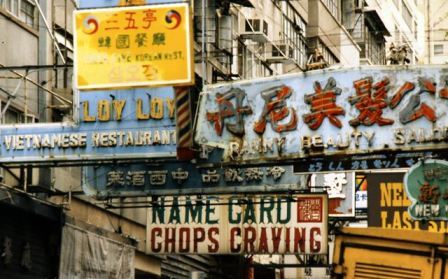
Downtown Kow Loon
|
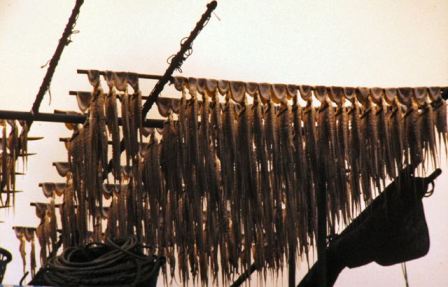
Fish drying, Aberdeen
Harbour
|
|
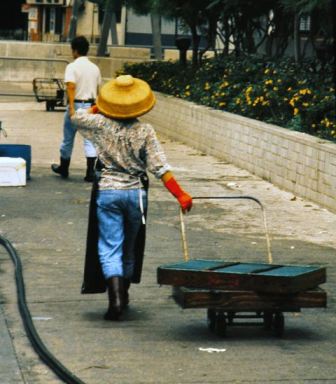
Aberdeen Harbour, Hong
Kong
|
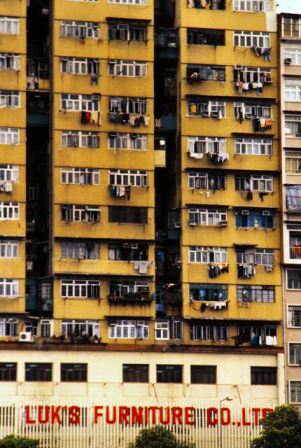
High-rise living, Aberdeen, Hong Kong
Family apartments: 200 square feet
|
|
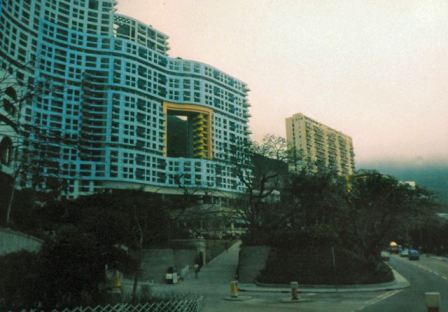
Modern apartments with Dragon Hole
(The building is sited on the path of a dragon, and so to avoid bad
luck for the residents a hole was left for the dragon to fly
through.)
|
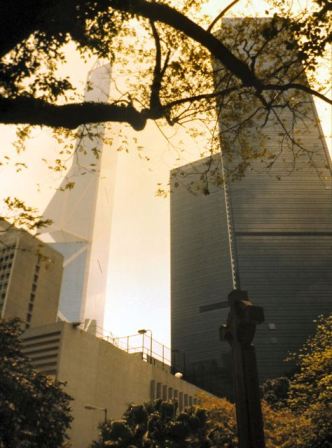
Celtic Cross & Bank of China, Hong
Kong
|
|
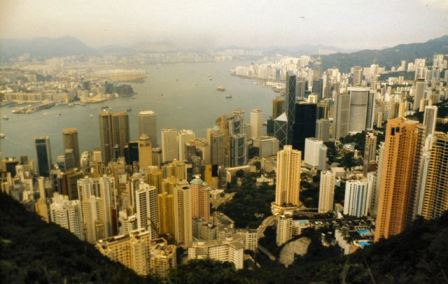
Hong Kong from Victoria Peak
|
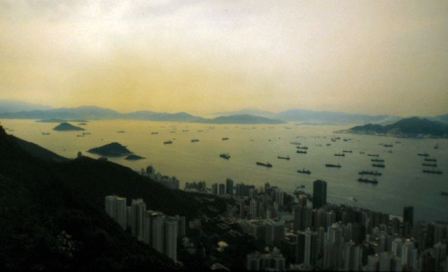
Looking North-west from
Victoria Peak |
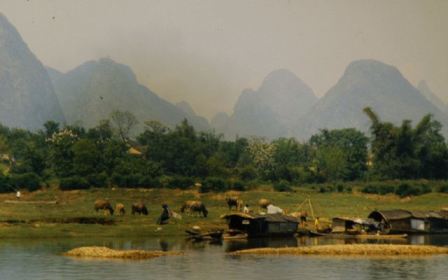
Li River, Guilin |
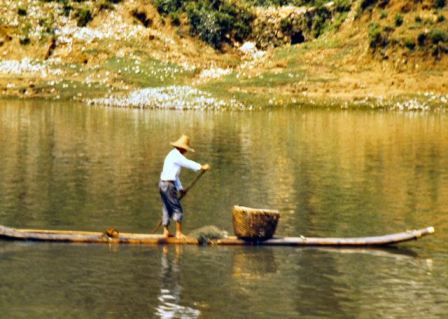
Li River, Guilin |
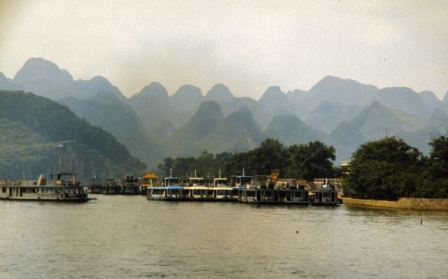
Li River, Guilin |
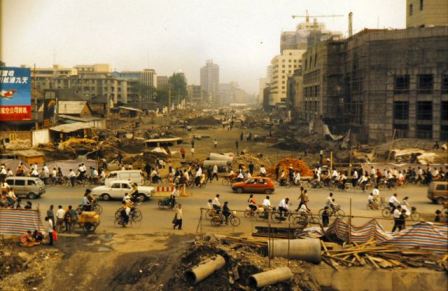
Building Site (Chengdu
city-centre) |
|
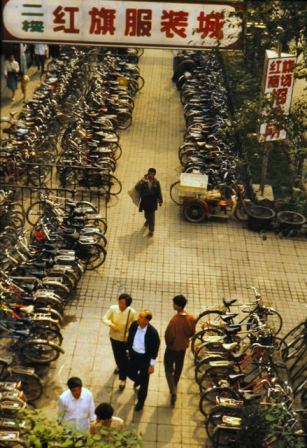
Parking lot, Chengdu |
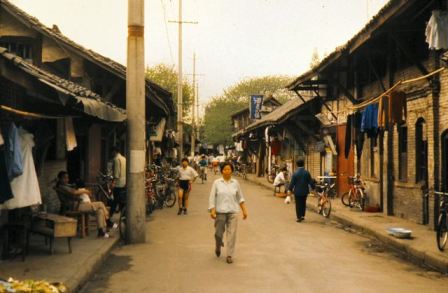
Back streets, Chengdu |
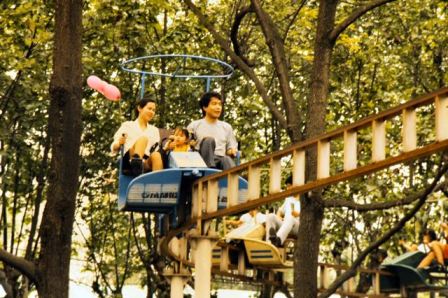
Pedal-power, Chengdu |
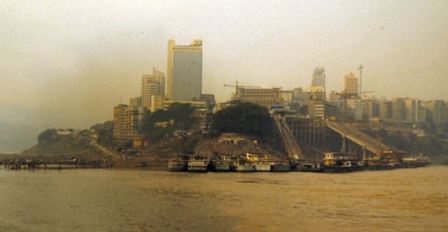
Confluence of Rivers
Yangtze & Jialing, Chong Qing |
|
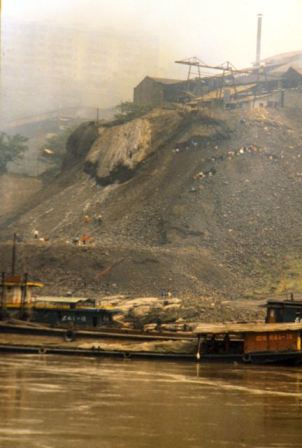
Pollution on the
Yangtze |
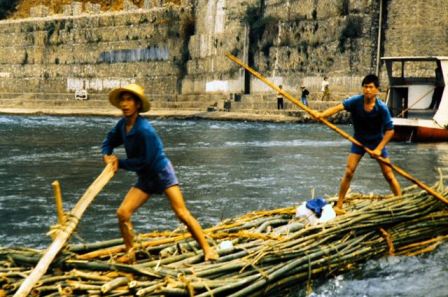
Transporting bamboo,
River Daning, Lesser Gorges
(bamboo poles sent down-river by lashing them together ~ and hoping
for the best) |
|
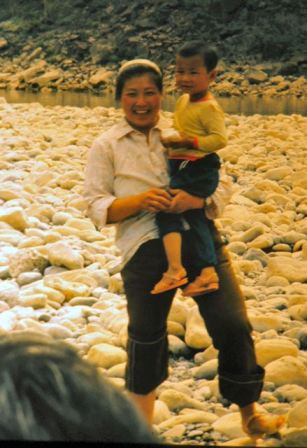
Watching the tourists,
River Daning, Lesser Gorges |
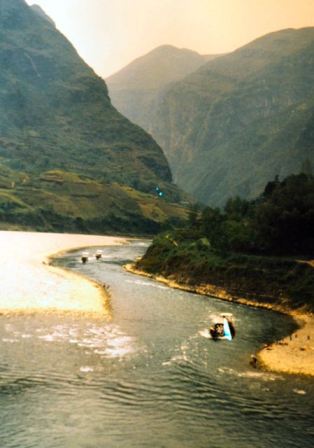
River Daning, Lesser
Gorges |
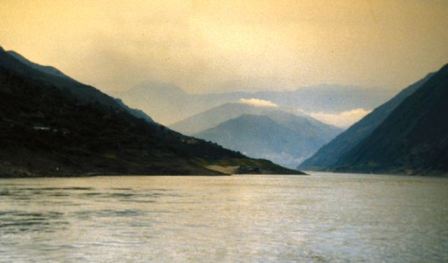
The Three Gorges |
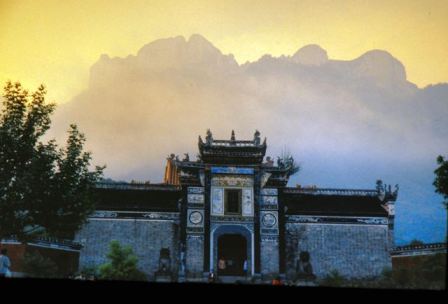
Huanling Temple, The
Yangtze |
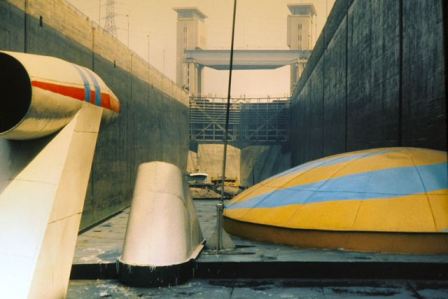
Passing through the
ship lock, Gezhou Dam, Yichang |
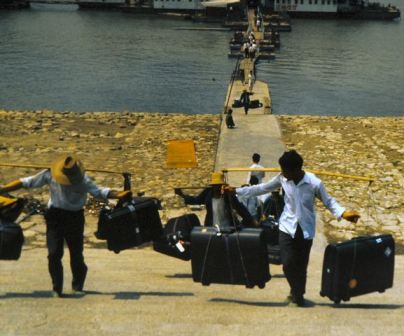
Porters at Yichang, end
of Yangtze cruise |
|

View from the karaoke
temple, Yichang |
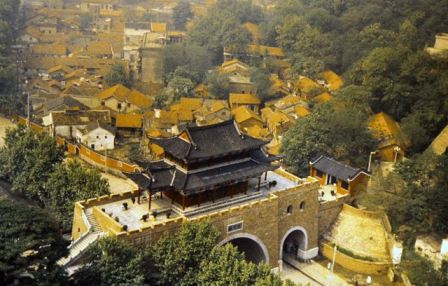
View from Qingchuan
Hotel, Wuhan |
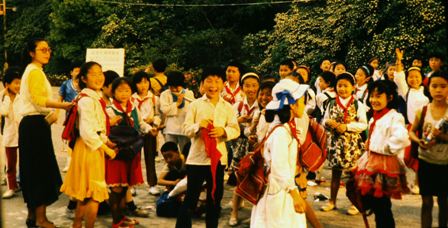
School Party, East
Lake, Wuhan |
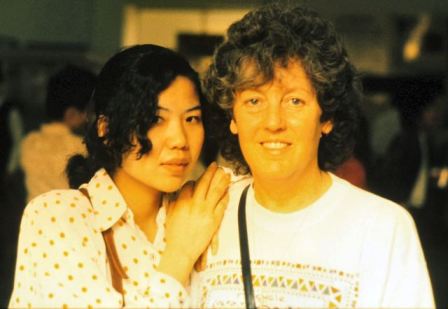
Sue with CITS guide at
Wuhan airport
|
|